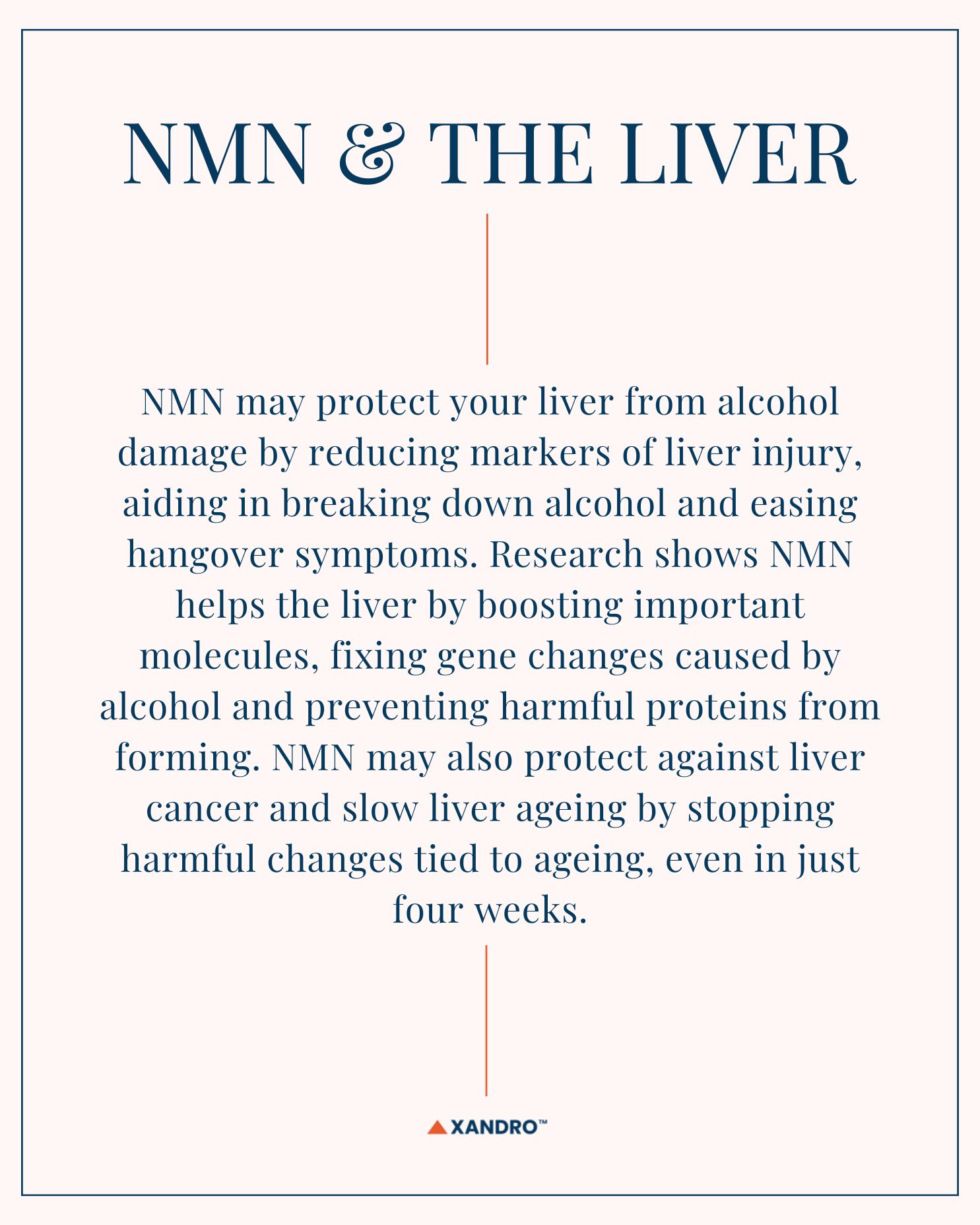NMN and Alcohol: Effects on Liver, NAD Levels and Side Effects
5th Jan 2025
NMN and Alcohol: Understanding Their Impact on Each Other
Have you ever taken a supplement in the morning or during the day then gone out to have a drink in the evening and taken a pause, wondering if the alcohol was interfering with whether your supplements would work properly?
It’s a logical question and one many people also have, and it’s an important one to ask, too, since alcohol interferes with the absorption of many dietary supplements. Whether it be preventing them from absorbing, increasing their absorption, dropping other levels within the body or having negative side effects, you must be aware of any potential risks.
This blog will cover nicotinamide mononucleotide (NMN) and alcohol consumption and whether you should be wary of taking an NMN supplement and alcohol together. Click the links below to head there now:
- Does Alcohol Affect NAD Levels?
- NMN and the Liver
- Potential NMN Side Effects
- How to Take NMN
- What Can’t You Take With NMN?
What alcohol, especially ethanol, does, is it drops NAD+ levels by at least 20 per cent, disrupting NAD+. So, rather than interfere with the precursor, NMN, it affects the compound that our body needs to stay at our peak, NAD+, which is made even worse since NAD+ levels drop with age. Low NAD+ levels affect the function of organs and disrupt metabolic levels and the circadian rhythm, among other functions.
Further Reading: NMN for Longevity
For those who regularly drink alcohol, NMN can be a supplement that helps boost NAD+ levels. Since ethanol can also cause tears in mitochondria and lower the activity of respiratory chain complexes, NMN, which can improve mitochondrial function, may be able to slow down this process.
Other than causing mitochondrial dysfunction, ethanol can also cause lipid accumulation. Taking NMN can help prevent this as, by increasing NAD+ levels, this activates SIRT1, which has an important role in protecting against both processes.
Further Reading: Interactions Between Magnesium Glycinate and Alcohol
One of the ways that alcohol harms the body is by damaging the liver. Long-term alcohol use can lead to alcoholic liver disease, encompassing a range of diseases, including alcoholic fatty liver, alcoholic hepatitis and alcoholic cirrhosis.
Is NAD hard on your liver? NAD+ is a molecule made in your body and one your body and liver need, so no, it’s not damaging to your liver. Along the same lines, ‘Is NMN bad for your liver?’ Again, NAD+ precursors are not considered harmful to the liver.
Further Reading: Safe Upper Limits of NMN
NMN may actually help protect against alcohol-induced liver damage. One of the ways it may do this is by preventing the increase of plasma levels of markers caused by ethanol. It may also help reduce alcohol-induced liver injuries as well as with alcohol metabolism, helping to flush alcohol out of the system and improve hangover symptoms.
One study found that NMN supplementation helped protect the liver from alcohol-related damage. It increased key liver molecule levels, reduced markers of liver injury and corrected changes in many genes affected by alcohol. This included stabilising specific cell signalling pathways and preventing harmful protein overproduction. These results suggest that NMN could protect the liver by targeting early damage mechanisms in alcohol-related liver disease.
Another study found that NMN may protect against liver cancer and slow down liver ageing. It found that NMN stopped the increase of ageing-related protein acetylation in the liver that occurs with age in just four weeks. Essentially, when the liver is healthy,
Further Reading: Magnesium and Alcohol FAQs

There are no known major side effects from taking NMN. Some people may experience mild and temporary digestive discomfort, such as bloating, nausea or an upset stomach in the initial stages of taking NMN until the body adjusts, while others may experience headaches or dizziness due to changes in NAD+ levels. Make sure to stay hydrated when taking supplements.
Further Reading: Alcohol and Supplements Drinking Guide
This will depend on the form of NMN you’re taking. NMN generally comes in capsules, powders and gummies, so it’s important to read the product directions on how to take it.
For example, for Xandro’s Pure NMN Powder, take 250–1200mg daily, starting by taking it with breakfast. Once you're used to it, you can switch to taking it an hour before breakfast on an empty stomach for better absorption. Begin with 350mg daily and increase gradually, taking it once or twice a day. Mix half a scoop (scoop provided) with water, food like yoghurt or let it dissolve under your tongue. Pairing it with Trans-Resveratrol boosts its effectiveness.
For Xandro’s Pure NMN Capsules, take one 500mg capsule daily, preferably with food in the morning or afternoon.
Further Reading: Ageing and Immune System Immune Health Routine
NMN supplements generally don’t interfere with other supplements, but it’s best to wait 30—60 minutes between taking them. Check the ingredients, as some NMN products may include herbs that could interact with medications. Since NMN might lower blood pressure, monitor your levels or talk to your doctor if you’re on blood pressure medication before starting on NMN supplements.
End Note
It’s important to know about any possible interactions between the supplements you take and other medications or drugs you take. Some may negate the benefits of the supplements you’re taking or cause adverse side effects, which you want to avoid. Keep yourself educated and make sure to speak with your doctor before adding any supplement to your diet.
If you want to experience the liver and anti-ageing benefits of NMN, be sure to check out Xandro’s Pure NMN! You can read what people are saying about it here!
